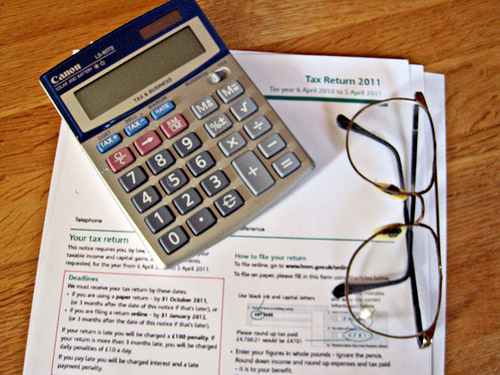You have until April 15th to file a personal tax return, but the due date for businesses is March 15th. That date quickly creeps up if you aren’t preparing yourself ahead of time. If you want to get organized and make this year’s tax season a breeze, take a look at these six tips for preparing your business to file taxes.
Research the Tax Forms Applicable to Your Business

Image via Flickr by Images_of_Money
There are all sorts of paperwork involved in starting a business and paying taxes, especially the first year that your business is open. Be ready for taxes this year by researching all the tax documents you’ll need to use. For instance, if you are hiring contractors, you’ll need the 1099-MISC form, and if you are operating as a sole proprietorship you’ll need to file the Schedule C. Try to figure all this out before tax season to eliminate the headache. A tax professional can help.
Keep All of Your Tax Documents in One Place
At the beginning of every year, add a folder to your file system that is dedicated to tax documents. It is the place where you will put 1099 and W-2 forms, along with profit and loss statements, and any other documents that are applicable to your taxes. This tip might seem obvious, but it’s something that a lot of businesses overlook, especially when they are in the start-up stages. Even if you go out of business, you still have to file a tax return to show whether you made any money or not.
If you’ve never been a fan of the paper trail, you can store most of your tax information on a computer instead of in a file drawer. Just make it a habit to scan any document that might be needed for taxes as soon as you get it, so that you have a digital copy to send to your accountant, and you’ll be better prepared for tax season.
Never Throw Away a Receipt Again
Just like you want to hold on to tax documents, you also want to hold on to any receipts that affect your business. The IRS does not typically ask to see receipts, but they will come in handy if your business ever gets audited. Plus, it’s great to have receipts on hand to check the accuracy of your accounting software. It’s easy to make mistakes, so your receipts become your safeguard.
Have Contractors Fill Out W-9 Forms
As a business, you are required to send a 1099 tax form to all contractors to whom you paid $600 or more. However, this becomes difficult if you do not have their contact information and social security numbers handy. Instead of scrambling to collect this information at the end of the year, have all your contractors fill out a W-9 form before they do any work for you. That way you will have their information on hand if they earn more than $600.
Meet With a Tax Professional
Some businesses are tempted to file taxes without the help of a tax professional, but this is a mistake. Business taxes are particularly complicated, and you’ll save yourself a headache if you consult with a tax professional. If you were to file your taxes without help, you could be missing out on savings that accountants are good at spotting. Besides, not all tax professionals are expensive, and you can use Sage’s free accounting software to collaborate with your accountant instead of meeting in person. That makes doing taxes much easier.
Look Into Your Payment Options
Most businesses end up owing money to the IRS. This is not a problem if you’ve been saving money to cover the bill or have been paying quarterly. However, if your business does not have the resources to pay in full what you owe the IRS, it’s important to look into payment plan options. The IRS is willing to work with businesses that owe more than they expected, but it’s good to know your options ahead of time.
Follow these tips and tax season won’t be the headache you’re used to. It is possible to be prepared and have everything run smoothly.

Leave a Reply